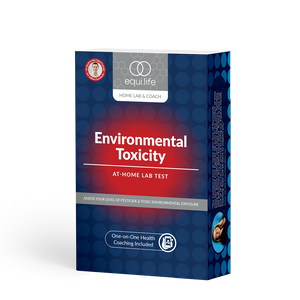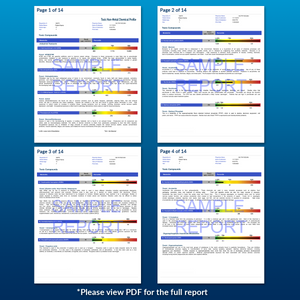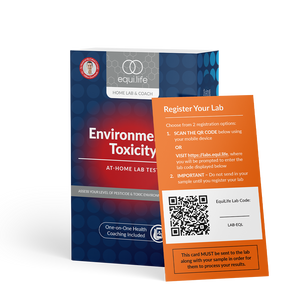



Do you feel like you are struggling to keep up with daily life, run down or simply not quite yourself? Skin rashes, brain fog, poor sleep and weakened immunity are just some of the common signs of years of environmental toxicity exposure from chemicals prevalent in today's world. With well over 77,000 man made chemicals infiltrating our environment, it's no longer a question of whether or not your body is harboring toxins, but rather how many. This Environmental Toxicity Test will show you your "Total Toxic Load" so you can assess where you're at now and help you make the best decisions about your health going forward.

Our exposure to environmental toxins is unavoidable and can have debilitating effects on our health. When toxin exposure builds up over time, the body can react with moderate to severe symptoms including skin rashes, poor sleep, headaches, brain fog, lowered mood, and higher levels of inflammation. Without discovering whether your symptoms may be caused by high exposure to toxins in your environment, your condition may worsen leading to poor health and more serious issues. This at-home lab test can be used as a comprehensive baseline to understand which toxic chemicals from the environment, pharmaceuticals and more that you have been exposed to.
When we are unaware of the effects that environmental toxins have on our body, we may spend tremendous energy and resources trying to solve mysterious health issues. This is one of the rare and easy to complete at-home labs that will show you once and for all how you're doing in terms of detoxing from some of the most harmful chemicals in the world. High levels of toxins can wreak havoc on our body's ability to function optimally and armed with your individual test results, an EquiLife Health Coach can clarify the important steps you can take to reduce overall toxicity levels, rebalance your body and improve your health. You'll also be able to see your progress as you begin to eliminate years of potential build-up and stored toxins.
Every day, we are exposed to hundreds of toxic chemicals through products like pharmaceuticals, pesticides, insecticides, herbicides, packaged foods, household products, and environmental pollutants in water, food and air.
Phthalates may be the most widespread group of toxins in our environment, commonly found in many bath and beauty products, cosmetics, perfumes, oral pharmaceuticals, insect repellents, adhesives, inks, and varnishes
Vinyl Chloride: An intermediate in the synthesis of several commercial chemicals, including polyvinyl chloride (PVC).
Benzene: An extremely toxic chemical that is mutagenic and carcinogenic that is widespread in the environment. Benzene is a by-product of all types of industrial processes and combustion, including motor vehicle exhaust and cigarette smoke, and is released by out gassing from synthetic materials
Pyrethrins: Widely used as insecticides. Exposure during pregnancy doubles the likelihood of Autism
Xylenes (dimethylbenzenes): Found in common products such as paints, lacquers, pesticides, cleaning fluids, fuel and exhaust fumes, perfumes and insect repellents
Styrene/Ethyl benzene: Used in the manufacturing of plastics, in building materials, and is found in car exhaust fumes
Organophosphates: Organophosphates are one of the most toxic groups of substances in the world, primarily found in pesticide formulations
MTBE and ETBE: gasoline additives from exposure to groundwater contamination, inhalation or skin exposure to gasoline or exhaust fumes
2,4-Dichlorophenoxyacetic Acid (2-,4-D): A very common herbicide, most commonly used in agriculture on genetically modified foods, and as a weed killer for lawns
Diphenyl Phosphate: A metabolite of the organophosphate flame retardant triphenyl phosphate (TPHP), which is used in plastics, electronic equipment, nail polish and resins
Acrylamide: Used in many industrial processes such as plastics, food packaging, cosmetics, dyes, and treatment of drinking water. Food and cigarette smoke are also two major sources of exposure. Acrylamide has been found in foods like potato chips and French fries
Perchlorate: used in the production of rocket fuel, missiles, fireworks, flares, explosives, fertilizers, bleach and studies show it is often found in water supplies and many food sources
1,3 butadiene: A chemical made from the processing of petroleum. It is often a colorless gas with a mild gasoline-like odor. Most of this chemical is used in the production of synthetic rubber
Propylene oxide: This chemical is used in the production of plastics and is used as a fumigant. It is used to make polyester resins for textile and construction industries. It is also used in the preparation of lubricants, surfactants, and oil demulsifiers. It has also been used as a food additive, an herbicide, a microbicide, an insecticide, a fungicide, and a miticide
1-bromopropane: 1-bromopropane is an organic solvent used for metal cleaning, foam gluing, and dry cleaning
Ethylene oxide: Used in many different industries including agrochemicals detergents, pharmaceuticals, and personal care products. Ethylene oxide is also used as a sterilizing agent on rubber, plastics, and electronics.
Acrylonitrile: Used in the production of acrylic fibers, resins, and rubber. Use of any of these products could lead to exposure to acrylonitrile. Smoking tobacco and cigarettes is another potential exposure
Acrolein: Commonly used as an herbicide to control submersed and floating weeds and algae in irrigation canals. Humans are exposed orally via fried foods, alcoholic beverages and water), respiratory (cigarette smoke and automobile exhaust) and topically.
Tiglylglycine (TG) is one of the most specific markers for mitochondrial disorders.
Tiglylglycine (TG) is a marker for mitochondrial disorders resulting from mutations of mitochondrial DNA, which can manifest from exposure to toxic chemicals, infections, inflammation, and nutritional deficiencies.
A pollutant is a substance introduced into the environment that has an adverse effect upon a natural resource. Certain pollutants may be disintegrated via the biological metabolism of microorganisms (biodegradation) creating additional metabolites.
2-3-4 Methylhippuric Acid (2,-3-,4-MHA)
N-acetyl phenyl cysteine (NAP)
Phenylglyoxylic Acid (PGO)
2-Hydroxyisobutyric Acid (2HIB)
Monoethylphthalate (MEP) - Diethylphthalates
Dimethylphosphate (DMP) & Diethylphosphate (DEP)
3-Phenoxybenzoic Acid (3PBA)
2,4-Dichlorophenoxyacetic Acid (2-,4-D)
Tiglylglycine (TG)
N-acetyl-S-(2-carbamoylethyl)cysteine (NAE)
Diphenyl Phosphate
Perchlorate
N-acetyl(3,4-dihydroxybutyl)cysteine (NADB)
N-acetyl(2-hydroxypropyl)cysteine (NAHP)
N-acetyl(propyl)cysteine (NAPR)
2-hydroxyethyl mercapturic (HEMA)
N-acetyl (2-cyanoethyl) cysteine (NACE)
N-acetyl-S-(3-hydroxypropyl)-L-cysteine (3-HPMA)
EquiLife labs are designed to provide detailed and thorough information so that you can understand your health at the deepest level, allowing you to finally get to the root cause of your biggest health concerns.
To ensure you feel confident about your lab findings, EquiLife provides a complimentary, one-on-one call with a certified Health Coach who will review your results with you in-depth and answer any questions you have.
Testing takes the guesswork out of your health and empowers you to make informed choices about your health. After reviewing your results, Health Coaches will provide recommendations to help you achieve your goals.
Get to the Root Cause
Once you receive your at-home lab test, please follow the instructions provided to register your test. Once sample(s) are sent to one of our CLIA certified labs, it will take approximately 3 weeks for your results to be returned, during which time you will receive information on how to schedule your one-one-one health coaching call.
All at-home lab tests expire 6-months from their purchase date. To ensure you will receive your results, please be sure to send all samples for completed lab tests prior to the 6-month expiration date. Unfortunately, there can be no returns or replacement lab tests sent after the 6-month time frame.
Please remember to register your labs prior to sending your sample to the laboratory.
We have compiled thorough FAQs for our at-home lab tests, which you can browse here:
https://faq.equi.life/en-US/articles/lab-kit-faq-14490
For additional questions, you can contact us at support@equi.life.



